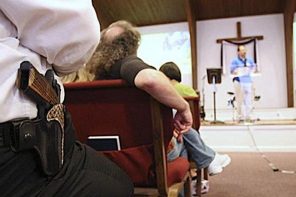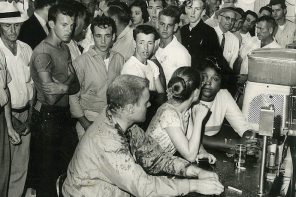My father is my hero. Like his folk-legend namesake John Henry, my father modeled physical strength, moral fortitude, and a work ethic that comparatively puts Max Weber’s Anglo-privileged Puritans to shame. He is far from an anomaly. My father is no different than the countless African American fathers across this country who are devoted to their daughters and sons. And as an active African American father myself, I am thankful for all of the wonderful examples of fatherhood that I have witnessed throughout the course of my life. Proud black men in my family, neighborhood, and church taught me that the characteristics of a good father transcend race, income, and even marital status.
Unfortunately, such men are rarely acknowledged and even less affirmed. There is a profound deficiency in the public understanding of African American fatherhood. Cliff Huxtable aside, African American fathers are all too often represented as absentee sperm donors; socially and economically irresponsible. This is even true in the one place that one might think African American men might be celebrated, the black church.
Over the years, I have come to have little appreciation or tolerance for Father’s Day Sunday services within many black Christian congregations. Rather than being a moment, like Mother’s Day, to lift up the love and commitment of African American parenting, it has become an opportunity for some “Strong Black Man” to stand behind the pulpit and lecture to mostly female congregants about black male accountability. Anyone who has spent time in a predominantly black congregation is familiar with these patriarchal and patronizing tropes of chastisement that were sharpened somewhere between the Moynihan Report and the Million Man March. “Men, it’s time to take responsibility and be fathers!” “It doesn’t take a man to make a baby, but it takes a man to raise a child!” “Black men, it is time to stand up and assume your rightful place as head!” And by the end of the worship service, instead of feeling honored, one feels as if they just sat through a Tyler Perry stage play.
For these reasons, I was saddened but not surprised to hear presumptive Democratic nominee Barack Obama use Father’s Day to deploy and extend this well-worn pathology discourse at a traditional black church on Sunday. Standing before Chicago’s Apostolic Church of God (and throngs of journalists), Senator Obama used the moment to wax eloquently about how black fathers are “missing from too many lives and too many homes,” and how black men have “abandoned their responsibilities, acting like boys instead of men.” As a result of the numerous national news headlines on the Monday following Father’s Day (“Obama Calls for More Responsibility from Black Fathers,” New York Times), Senator Obama has contributed to a conception of the responsible African American father as the shocking exception as opposed to the standard norm.
My disillusionment with such criticisms does not seek to dismiss or deny the problems African Americans need to confront. The American cultural ills of perverted masculinity and family breakdown—which are particularly acute in poor black neighborhoods—must be a part of our spiritual and political agendas for social renewal. I do question, however, why it is that the black church seems so obsessed with negatively critiquing the deviance of some, while invariably ignoring the responsibility of many. I am inclined to believe that it may have to do with the insecure intersections of race, class, and gender that continue to handicap black public discourse in general and effective Christian witness within the traditional black church in particular.
Public criticisms of “black pathology” have typically functioned on two levels in the black church: the social and the personal. On the social level, condemning practices commonly attributed to the black poor serves to bolster middle class privilege by distancing the black church from the perceived deviant mores of “ghetto” society. The black church is thus able to obscure its own gross patriarchy and self-indulgent tendencies that are as American as Wall Street greed. On the personal level, by saying “Amen” to such accusatory and self-righteous rhetoric, individuals are able to reaffirm their own sense of holiness and moral virtue. As opposed to praying, “Lord, have mercy on me,” persons profess, “Lord, thank God I am not like them!” In turn, rather than becoming humble fishers of men and women who are the most in need, many traditional black churches become keepers of a wanna-be bourgeois aquarium.
With his address on Sunday, however, Senator Obama has raised this internal tension of the black church to another level; an unashamedly political one. By taking this opportunity within a black pulpit to pounce on African American men, he is able to continue his “insider/outsider” two-step with the black community. On the one hand, like Bill Cosby’s well-publicized remarks on African American deviance, he will be heralded by sectors of the black community for “keeping it real” and “speaking the truth.” On the other hand, he can signal to the dominant society that he has little sympathy for the irresponsibility and victim-identity that characterizes the black community in the dominant imagination. Senator Obama, then, might be perceived by some of his more conservative critics as having the courage to place blame for social ills where it belongs: at the feet of the immoral individual. All the while, he reinscribes unhealthy stereotypes, and fails to positively affirm the majority of African American men who are concerned and committed to raising their children.
My aim here is not to suggest that public figures should only emphasize the positive and ignore the negative dimensions of black life. Like all human beings, black folks are flawed even when faithful, and can be wrong even when committed to the right. But one would hope black preachers, politicians, and pundits might begin to understand the difference between healthy admonishment and outright assault on African American humanity. In a society seemingly obsessed with perverted images of black masculinity, Father’s Day provided prominent voices like Senator Obama’s the chance to celebrate everyday heroes who are unfortunately ensconced under negative cultural stereotypes. Instead, Father’s Day became the Senator’s opportunity to throw African American fathers under the campaign bus of irresponsibility in order to appeal to a particular voting bloc. To recall the response of Florida Evans when confronted with the death of her beloved husband and committed father, James Evans, on the classic African American sitcom Good Times, all I can say to this is, “Damn, Damn, Damn!”



